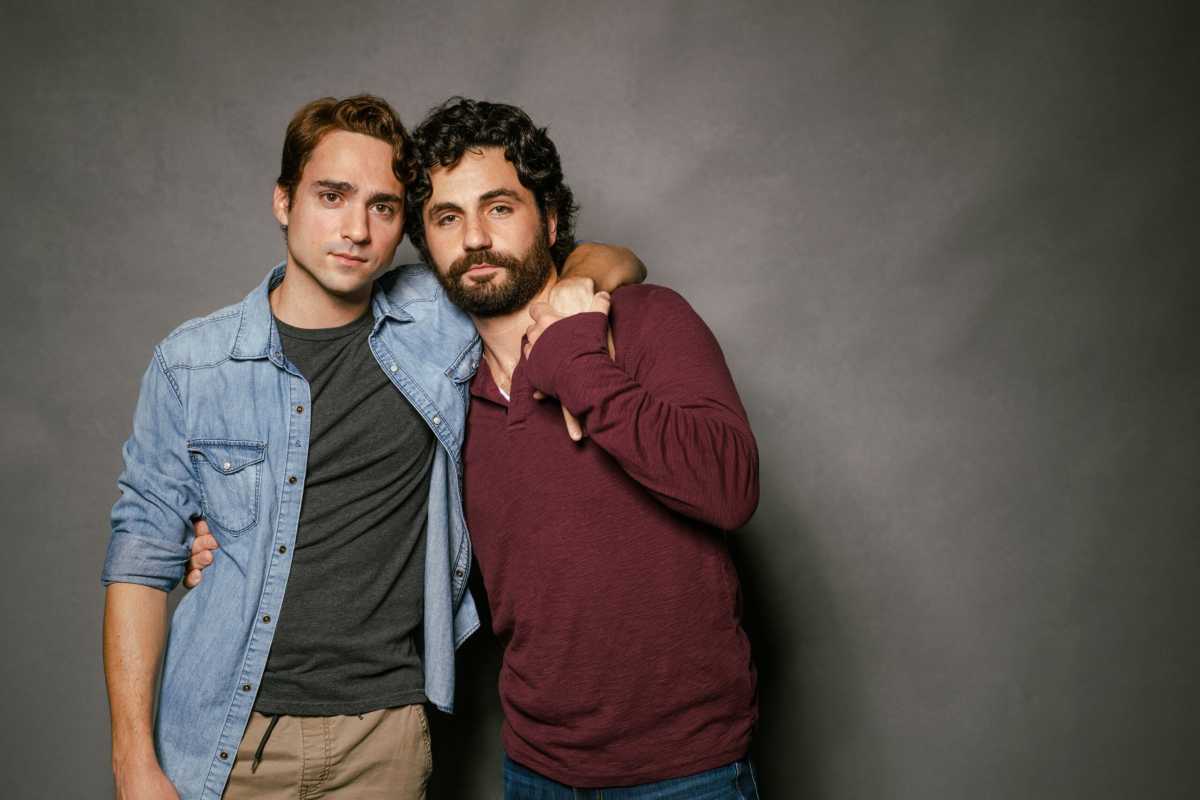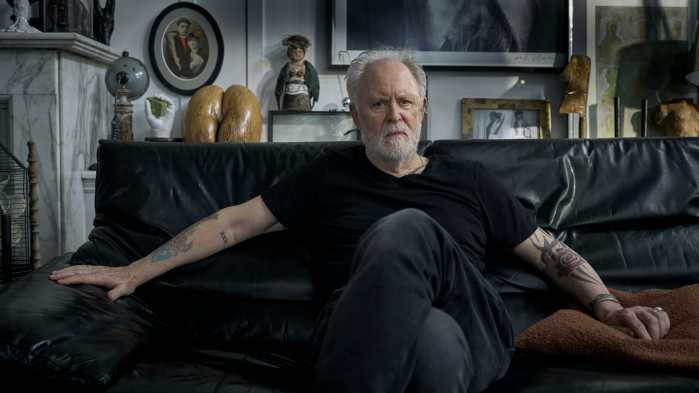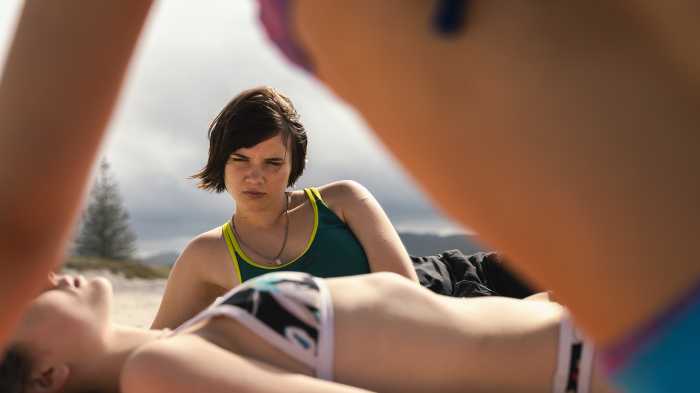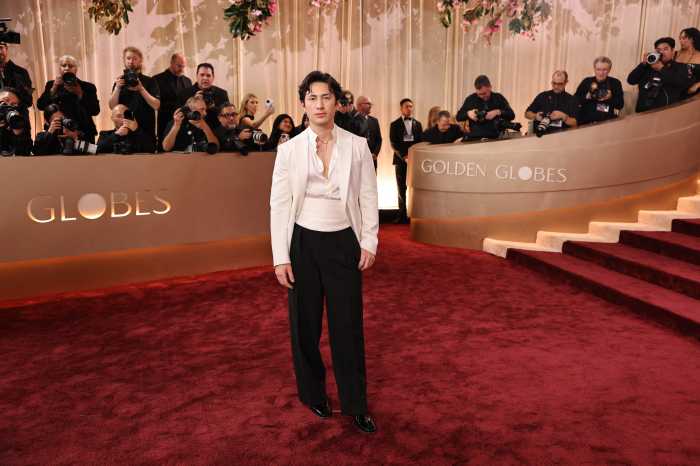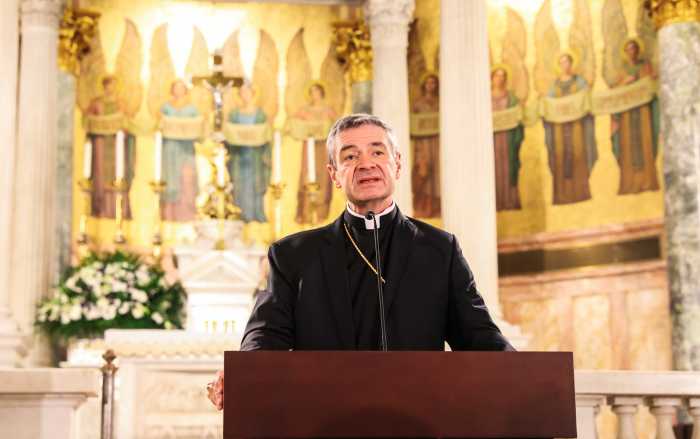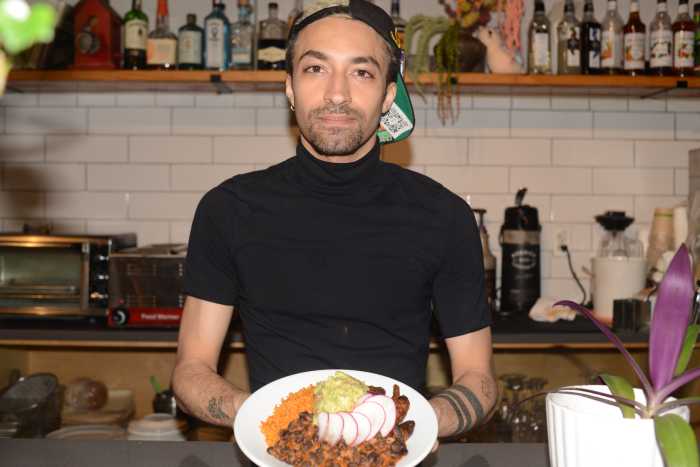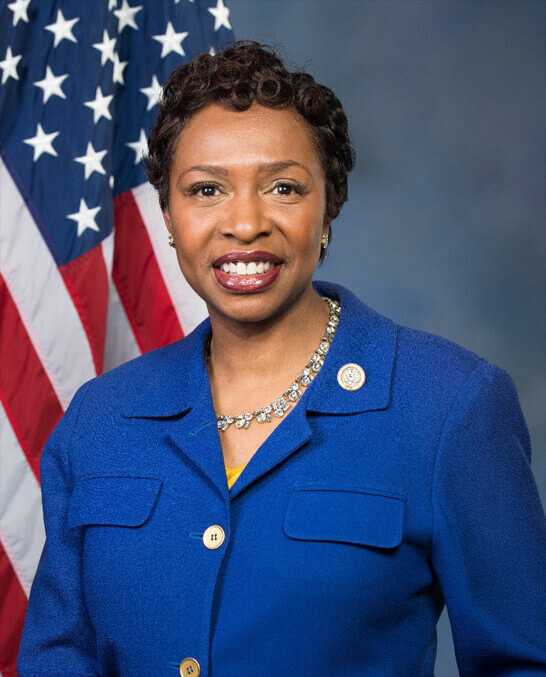Two gay men become friends in writer/director Jono Mitchell’s sweet, low-key bromance, “Bad Together.” Robbie (Andrés Erickson) has just broken up with his boyfriend when he reluctantly agrees to attend a party where he meets Cameron (Queer Niro), who is involved with Seth (Danny O’Brien). The two strangers become friends, and even agree to a condition that they can be mad but can never hate each other. The film depicts six encounters Robbie and Cameron have over the course of several years.
“Bad Together” shows how these friends change and grow between meetings, with breakups, moves, and other issues. Each segment features a heart-to-heart chat that tests their loyalty to each other.
Erickson and Niro spoke with Gay City News about friendships and making “Bad Together.”
Were you guys friends prior to making the film?
Queer Niro: We met on set of “Doom Patrol.” Randomly, we had a scene together and had to make out and hook up. It was so ridiculous. We were in these crazy costumes.
Andrés Erickson: “Doom Patrol” was 2 ½, maybe 3 years ago. We did a short film together and that started “Bad Together.”
What can you say about the difficulties of making friends as adults? This film is very much like how actors have intense friendships as they work, move around, and then maybe reconnect.
Erickson: I keep my close circle very small. Weirdly on set, I connect with people really fast — because I guess you are supposed to. You have a lot in common as actors. I click fast with other actors, like Niro. We connected really well on set. But once you are done, you move on, and a couple people will stay as real friends and you will keep them in your life. That’s one of the great things about acting — you meet a lot of good people and make a lot of good connections.
Niro: I’ve heard people relate it to camp. You get really close, and have a good time, then it is sad when you say goodbye. But you have those memories. Maybe you’ll see them in the future, but you will always have that movie, or that summer when you had a bunch of fun with them.
What about your real lives? Do you have trouble making friends or keeping friends?
Niro: I came out at 25, but I really embraced my queerness last year. I went all in and was really aggressive and met people and joined clubs and asked people, “Hey can I hang out with you all?” That helped. Making friends as an adult is hard. Everyone has their groups. I want to spend time with people I like, so I had to hit it really hard. It worked.
Erickson: It is difficult to make friends as an adult. Most of my close friends are ones I’ve made as an adult. I don’t have many close friends from high school, and only a couple from college.
The friendship between Robbie and Cameron has moments of intensity, but what is admirable is how honest they are with each other. Can you talk about that? They say things you probably wouldn’t say to your best friend.
Niro: It’s important and hard when you realize what friendships are becoming, and if you are bold enough to actually say it out loud, you can confront the feelings and what’s wrong with the relationship. Because it either goes well, or it doesn’t, and you stay friends, or you don’t. It depends on how much of an adult you want to be. We are petty, we can be understanding, vulnerable, angry. You don’t know who is going to react in what way. That’s the difficulty of confronting that stuff with friends.
What can you say about the shifting power between your characters? Cameron is more impulsive and needy; Robbie is more controlling.
Erickson: They just met at a weird time. I don’t think either of them is necessarily a “bad person.” They have flaws, but we all have our flaws. They were so vulnerable when they met, that connection was strong, so when that started to waver, things felt more personal, and the claws came out sooner than they might with other friendships.
Niro: The friendship feels so intense that it feels like a relationship. Friendships are like relationships, where you have a honeymoon phase, and you don’t know how long that will last. Then you start to see the real person, and either you like the real person, or you don’t. Things clash. Someone is really outgoing and wild or someone is more controlling. You are not playing around anymore. So, do you still like each other? Do you still love each other as friends at the end? Or does it not work? Robbie and Cameron butt heads more than they thought they would.
What observations do you have about friendships versus relationships?
Erickson: I don’t know that I have friendships that mirror relationships in that way. You have more lenience with friends, because you are not going to bed with them or seeing them very day. You have space naturally. You don’t have that in a relationship, so it’s easier for things to be forgiven or talked about because not there to butt heads all the time.
Niro: That’s what I struggle with. In relationships, you have sex, you touch skin. It’s intimate. Friendships, you hug, or kiss on the cheek. I don’t see a relationship and friendship being the same.
What about resentment and toxicity? There is some real anger that develops between Cameron and Robbie.
Niro: It is hurtful to see that, but it feels very real. It comes from a place of hurt. The fact that they are being petty and toxic is worse.
Erickson: In real life, I would not handle things like Robbie or Cameron do. I wouldn’t be as petty.
Niro: On screen it’s “Let’s be petty and go at it.” In real life, let’s be mature about this—but that’s not fun to watch.
“Bad Together” | Directed by Jono Mitchell | Available on TVOD December 5 | Distributed by Dekkoo Films.

